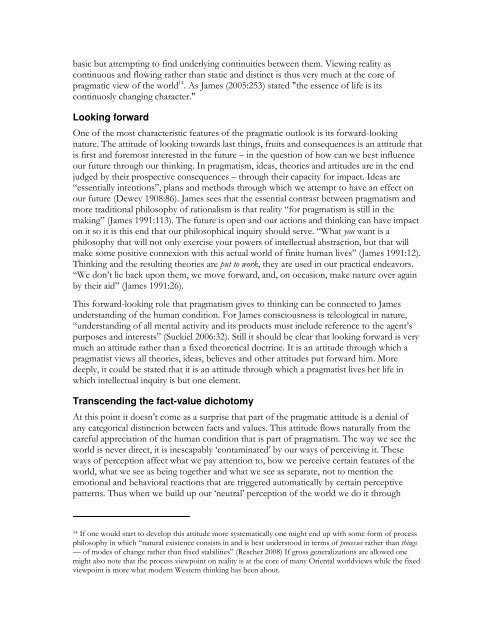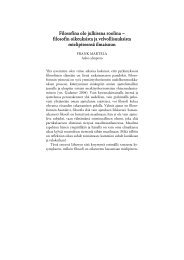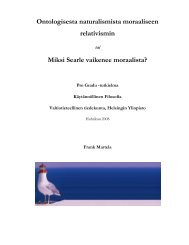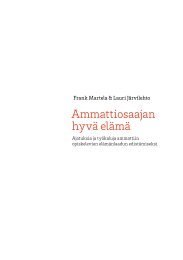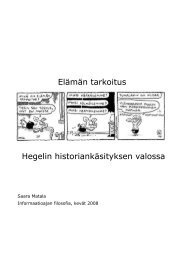Pragmatism as an attitude - Frank Martela
Pragmatism as an attitude - Frank Martela
Pragmatism as an attitude - Frank Martela
Create successful ePaper yourself
Turn your PDF publications into a flip-book with our unique Google optimized e-Paper software.
<strong>as</strong>ic but attempting to find underlying continuities between them. Viewing reality <strong>as</strong><br />
continuous <strong>an</strong>d flowing rather th<strong>an</strong> static <strong>an</strong>d distinct is thus very much at the core of<br />
pragmatic view of the world 14 . As James (2005:253) stated "the essence of life is its<br />
continuosly ch<strong>an</strong>ging character."<br />
Looking forward<br />
One of the most characteristic features of the pragmatic outlook is its forward-looking<br />
nature. The <strong>attitude</strong> of looking towards l<strong>as</strong>t things, fruits <strong>an</strong>d consequences is <strong>an</strong> <strong>attitude</strong> that<br />
is first <strong>an</strong>d foremost interested in the future – in the question of how c<strong>an</strong> we best influence<br />
our future through our thinking. In pragmatism, ide<strong>as</strong>, theories <strong>an</strong>d <strong>attitude</strong>s are in the end<br />
judged by their prospective consequences – through their capacity for impact. Ide<strong>as</strong> are<br />
“essentially intentions”, pl<strong>an</strong>s <strong>an</strong>d methods through which we attempt to have <strong>an</strong> effect on<br />
our future (Dewey 1908:86). James sees that the essential contr<strong>as</strong>t between pragmatism <strong>an</strong>d<br />
more traditional philosophy of rationalism is that reality “for pragmatism is still in the<br />
making” (James 1991:113). The future is open <strong>an</strong>d our actions <strong>an</strong>d thinking c<strong>an</strong> have impact<br />
on it so it is this end that our philosophical inquiry should serve. “What you w<strong>an</strong>t is a<br />
philosophy that will not only exercise your powers of intellectual abstraction, but that will<br />
make some positive connexion with this actual world of finite hum<strong>an</strong> lives” (James 1991:12).<br />
Thinking <strong>an</strong>d the resulting theories are put to work, they are used in our practical endeavors.<br />
“We don’t lie back upon them, we move forward, <strong>an</strong>d, on occ<strong>as</strong>ion, make nature over again<br />
by their aid” (James 1991:26).<br />
This forward-looking role that pragmatism gives to thinking c<strong>an</strong> be connected to James<br />
underst<strong>an</strong>ding of the hum<strong>an</strong> condition. For James consciousness is teleological in nature,<br />
“underst<strong>an</strong>ding of all mental activity <strong>an</strong>d its products must include reference to the agent’s<br />
purposes <strong>an</strong>d interests” (Suckiel 2006:32). Still it should be clear that looking forward is very<br />
much <strong>an</strong> <strong>attitude</strong> rather th<strong>an</strong> a fixed theoretical doctrine. It is <strong>an</strong> <strong>attitude</strong> through which a<br />
pragmatist views all theories, ide<strong>as</strong>, believes <strong>an</strong>d other <strong>attitude</strong>s put forward him. More<br />
deeply, it could be stated that it is <strong>an</strong> <strong>attitude</strong> through which a pragmatist lives her life in<br />
which intellectual inquiry is but one element.<br />
Tr<strong>an</strong>scending the fact-value dichotomy<br />
At this point it doesn’t come <strong>as</strong> a surprise that part of the pragmatic <strong>attitude</strong> is a denial of<br />
<strong>an</strong>y categorical distinction between facts <strong>an</strong>d values. This <strong>attitude</strong> flows naturally from the<br />
careful appreciation of the hum<strong>an</strong> condition that is part of pragmatism. The way we see the<br />
world is never direct, it is inescapably ‘contaminated’ by our ways of perceiving it. These<br />
ways of perception affect what we pay attention to, how we perceive certain features of the<br />
world, what we see <strong>as</strong> being together <strong>an</strong>d what we see <strong>as</strong> separate, not to mention the<br />
emotional <strong>an</strong>d behavioral reactions that are triggered automatically by certain perceptive<br />
patterns. Thus when we build up our ‘neutral’ perception of the world we do it through<br />
14 If one would start to develop this <strong>attitude</strong> more systematically one might end up with some form of process<br />
philosophy in which “natural existence consists in <strong>an</strong>d is best understood in terms of processes rather th<strong>an</strong> things<br />
— of modes of ch<strong>an</strong>ge rather th<strong>an</strong> fixed stabilities” (Rescher 2008) If gross generalizations are allowed one<br />
might also note that the process viewpoint on reality is at the core of m<strong>an</strong>y Oriental worldviews while the fixed<br />
viewpoint is more what modern Western thinking h<strong>as</strong> been about.


